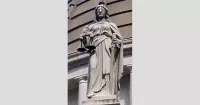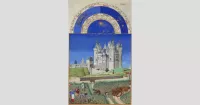Guyana, officially the Co-operative Republic of Guyana, is located on the northern coast of South America. Georgetown is its capital and largest city. Bordered by the Atlantic Ocean, Brazil, Venezuela, and Suriname, Guyana is the third-smallest sovereign state in mainland South America by area and the second-least populous. English is the official language, and the country boasts high biodiversity and a portion of the Amazon rainforest.
1912: The Lost World novel
Mount Roraima and Guyana's table-top mountains (tepuis) are said to have been the inspiration for Sir Arthur Conan Doyle's 1912 novel The Lost World.
1917: End of Indenture Contracts
In 1917, indenture contracts ended in Guyana, impacting the labor force.
1962: Venezuela Resuscitates Territorial Claim
In 1962, Venezuelan President Rómulo Betancourt revived Venezuela's claim to the disputed territory by declaring the 1899 arbitration award null and void.
1964: Last Election before 1992
The first internationally recognized free and fair election since 1964 was held in Guyana in October 1992.
May 1966: Independence from the United Kingdom
In May 1966, Guyana achieved independence from the United Kingdom as a dominion.
October 1966: Venezuelan troops seize Ankoko Island
In October 1966, five months after Guyana's independence, Venezuelan troops crossed the international border and seized Ankoko Island, constructing military installations and an airstrip.
1966: Independence
In 1966, Guyana gained independence from British rule.
1966: Agreement to Resolve Dispute
In 1966, Venezuela argued that an agreement to resolve the dispute effectively nullified the original arbitration.
1966: Treaty of Geneva
In 1966, the Treaty of Geneva was signed by the Governments of Guyana, the United Kingdom, and Venezuela to address the territorial dispute.
1967: Surinamese Survey Team Removed
In 1967, a Surinamese survey team was discovered in the New River Triangle and forcibly removed from the area.
August 1969: Conflict in the New River Triangle
In August 1969, a Guyana Defence Force patrol discovered a Surinamese survey camp and a partially completed airstrip in the New River Triangle. After an exchange of gunfire, the Surinamese were driven from the triangle.
February 1970: Guyana becomes a republic
In February 1970, Guyana became a republic while remaining a member of the Commonwealth.
1970: Republic within the Commonwealth of Nations
In 1970, Guyana officially became a republic within the Commonwealth of Nations.
1975: Member of the UN Security Council
In 1975, Guyana was elected as a member of the UN Security Council.
1978: Jonestown Mass Murder-Suicide
In 1978, 918 people died in the Jonestown mass murder-suicide led by Jim Jones in Guyana.
1982: Member of the UN Security Council
In 1982, Guyana was elected as a member of the UN Security Council.
1990: Literacy Rate
In 1990, Guyana's estimated literacy rate was 96 percent, one of the highest in the Caribbean.
1991: Entry into Organisation of American States
In 1991, Guyana became a member of the Organisation of American States.
1991: Caribbean Cup Qualification
In 1991, Guyana's national football team qualified for the Caribbean Cup, finishing fourth.
July 1992: Tax Information Exchange Agreement Signed
On 22 July 1992, Guyana signed the Tax Information Exchange Agreement in Georgetown, with the intention to exchange tax information automatically.
October 1992: First Free and Fair Election
In October 1992, Guyana held its first internationally recognized free and fair election since 1964, resulting in Cheddi Jagan's election as president, despite violence.
1992: First Constitutional Elections
In 1992, the first constitutional elections were overseen by former United States President Jimmy Carter in Guyana.
August 1994: Double Taxation Relief Treaty Signed
On 19 August 1994, representatives of Trinidad and Tobago and Guyana signed The Double Taxation Relief (CARICOM) Treaty 1994 at a CARICOM Meeting.
1999: Debt Relief
After 1999, the Guyanese economy rebounded slightly and exhibited moderate economic growth, furthermore, in 1999 Guyana qualified for US$256 million of debt relief from the original World Bank plan.
1999: Habitats categorised
In 1999, habitats were categorised for Guyana in the National Biodiversity Action Plan (NBAP).
2002: Census of Ethnic Groups
According to the 2002 census, the largest ethnic group in Guyana is the Indo-Guyanese.
2003: Debt Relief
In 2003, Guyana qualified for US$329 million of debt relief.
2003: Public Procurement Commission Act
The Public Procurement Commission Act was created in 2003 to oversee public procurement in Guyana.
February 2004: Konashen Community-Owned Conservation Area
In February 2004, the Government of Guyana issued a title to more than 4,000 km of land in the Konashen Indigenous District as the Kanashen Community-Owned Conservation Area, managed by the Wai Wai.
2006: Debt Relief Initiative
In 2006, the Multilateral Debt Relief Initiative wrote off about US$611 million of Guyana's debt by the International Monetary Fund, the World Bank and the Inter-American Development Bank, and Japan finalised its bilateral debt cancellation agreement.
September 2007: United Nations Ruling on Maritime Dispute
On 21 September 2007, a United Nations Convention on Law of the Sea ruling addressed the maritime component of the territorial dispute between Guyana and Suriname, finding both parties in violation of treaty obligations but ordering no compensation.
2007: Cricket World Cup Matches in Guyana
In 2007, Guyana hosted international cricket matches as part of the 2007 Cricket World Cup (CWC 2007). The Providence Stadium, with 15,000 seats, was completed in time for the event.
2007: Caribbean Cup Qualification
In 2007, Guyana's national football team qualified for the Caribbean Cup.
2007: Debt Written Off By China
In 2007, US$15 million of Guyana's debt was written off by China.
2007: Tax Code Overhaul
In early 2007, Guyana initiated a major overhaul of the tax code, replacing six different taxes with a Value Added Tax (VAT).
May 2008: Signatory to UNASUR Constitutive Treaty
In May 2008, President Bharrat Jagdeo was a signatory to the UNASUR Constitutive Treaty of the Union of South American Nations.
2008: Joined the Union of South American Nations
In 2008, Guyana joined the Union of South American Nations as a founding member.
2008: Economic Growth Amid Financial Crisis
In 2008, Guyana's economy grew by 3% amidst the global financial crisis.
2008: Lost Land of the Jaguar
In 2008, the BBC broadcast a three-part programme called Lost Land of the Jaguar which highlighted the wildlife diversity in Guyana.
2009: Collaboration with Norway
Since 2009, Guyana and Norway have collaborated to promote green development in Guyana.
2010: Ratification of UNASUR Treaty
In 2010, the Guyanese government officially ratified the UNASUR Constitutive Treaty.
November 2011: General Elections
In November 2011, the People's Progressive Party (PPP) retained a majority in the General Elections, and their presidential candidate Donald Ramotar was elected as president.
2011: HIV Prevalence
According to 2011 estimates from the WHO, HIV prevalence is 1.2% of the teen/adult population (ages 15–49) in Guyana.
2011: Economic Growth
In 2011, Guyana's economy grew by 5.4%.
2012: Statistics of suicide rates
According to the PAHO/WHO Global Health Report 2014 (using statistics of 2012), Guyana had the highest suicide rate in the world, with a mortality rate of 44.2 per 100,000 inhabitants.
2012: Economic Growth
In 2012, Guyana's economy grew by 3.7%.
2012: Religious Demographics
In 2012, the population of Guyana was 64% Christian, 25% Hindu, 7% Muslim, 3% irreligious and 1% of other faiths.
June 2014: FATCA Agreement Signed
On 30 June 2014, Guyana signed a Model 1 agreement with the United States of America regarding the Foreign Account Tax Compliance Act (FATCA).
2014: Highest Suicide Rate in the World
According to the PAHO/WHO Global Health Report 2014 (using statistics of 2012), Guyana had the highest suicide rate in the world.
2014: UNESCO Literacy Estimate
In 2014, a UNESCO estimate placed Guyana's literacy rate at 96.7% in the 15–24 year old age group.
May 2015: General Elections and New President
In May 2015, early general elections were held, resulting in a victory for the A Partnership for National Unity-Alliance for Change (APNU-AFC) coalition, which secured 33 out of 65 seats in the National Assembly. On 16 May 2015, David A. Granger became the eighth President of Guyana.
2015: President Granger in office
In 2015, David A. Granger began his term as president and served until 2020, expressing support for efforts to alter laws inherited from the British Empire.
2015: Gold Production
In 2015, Guyana's gold production was 14 metric tons.
2015: Discovery of crude oil
In 2015, crude oil was discovered in Guyana, transforming its economy.
2015: End of the People's Progressive Party leadership
The People's Progressive Party led Guyana until 2015.
2016: Appointment of Public Procurement Commission
In 2016, the Public Procurement Commission was finally appointed in Guyana due to lengthy delays in identifying and agreeing on commission members.
2017: Poverty Line
In 2017, 41% of Guyana's population lived below the poverty line.
December 2018: Vote of Confidence
On 21 December 2018, a vote of confidence was called regarding the government's franchise terms for offshore oil exploration. The vote failed due to a legislator's defection, necessitating new elections.
2018: Vote of No Confidence
In 2018, Granger's government lost a vote of no confidence, leading to snap elections.
2018: Cross-dressing Legalized
In 2018, a ban on cross-dressing was struck down by the Caribbean Court of Justice, Guyana's court of last resort, effectively legalizing it.
2019: Drilling Began
In 2019 drilling began in Guyana impacting the GDP.
2019: South American Beach Games
In 2019, Guyana participated in the South American Beach Games with a beach volleyball team.
2019: CONCACAF Gold Cup Qualification
In 2019, Guyana qualified for the CONCACAF Gold Cup for the first time, finishing seventh in the qualifiers.
2019: Commercial Drilling
In 2019, Guyana started commercial drilling for crude oil.
March 2020: Snap Elections Lost
In March 2020, President David A. Granger narrowly lost the snap elections.
August 2020: Election Results and New President
In August 2020, the results of the March 2020 elections were declared, with the People's Progressive Party/Civic emerging as the winner. Mohamed Irfaan Ali became the ninth President of Guyana.
2020: Life Expectancy at Birth
As of 2020, the estimated life expectancy at birth in Guyana is 69.5 years.
2020: President Granger out of office
In 2020, David A. Granger concluded his term as president.
2020: Economic Growth
In 2020, Guyana's economy grew by 49%, making it one of the fastest-growing economies.
2020: IMF Projected Economic Growth
In 2020, the IMF projected economic growth for Guyana to be 53% following the completion of the first off-shore oil project.
April 2021: Anticipated Growth
In April 2021, reports anticipated a 20% growth for 2021 in Guyana.
2021: Anticipated GDP Growth
In 2021, Guyana's GDP is anticipated to grow by 20%.
December 2023: Venezuelan Referendum and International Response
In December 2023, Venezuela held a referendum approving the creation of a new state in the disputed area, drawing condemnation from Guyana's President Irfaan Ali. The US and Brazil signaled support for Guyana, with the US conducting air exercises and Brazil sending troops to the border.
December 2023: Venezuelan Referendum on Essequibo Annexation
In December 2023, Venezuela held a referendum on annexing the disputed Essequibo region, which passed with a 95% majority but sparked war concerns due to military buildup.
2023: World Bank on Poverty and Growth Management
In 2023, the World Bank reported that significant poverty still exists in Guyana, which faces significant risks in structurally managing its growth.
December 2024: Projected Petroleum Producer
In December 2024, Guyana is projected to be the third largest per capita petroleum producing country in the world.
2024: Member of the UN Security Council
In 2024, Guyana was elected as a member of the UN Security Council.
2025: Oil Production
By 2025, Guyana is projected to become one of the largest per capita oil producers in the world.
Mentioned in this timeline
Venezuela officially the Bolivarian Republic of Venezuela is a country...
Suriname located in northern South America and sometimes considered part...

Football is a family of team sports primarily involving kicking...

The ICC Men's Cricket World Cup is a quadrennial international...

Justice in its broadest sense is the concept of treating...

September is the ninth month of the year in the...
Trending

3 months ago Belinda Bencic Advances in Hong Kong, Eyes WTA Title at Hong Kong Open

7 months ago Brokeback Mountain's 20th Anniversary: Challenging Hollywood and impacting audiences, starring Heath Ledger.

3 months ago Rose Bowl Sues UCLA over Alleged Attempt to Move Games to SoFi Stadium.

3 months ago Tereza Valentová Praised by Coco Gauff as a Potential WTA Tour Threat

2 months ago Trade Rumors Swirl: LaVine, DeRozan, and Potential NBA Team Swaps Discussed

3 months ago DeRozan Believes Clifford Can Be A Star; Kings Surprise Lineup Move.
Popular

Thomas Douglas Homan is an American law enforcement officer who...

Martin Luther King Jr was a pivotal leader in the...

XXXTentacion born Jahseh Dwayne Ricardo Onfroy was a controversial yet...

Instagram is a photo and video-sharing social networking service owned...

KFC or Kentucky Fried Chicken is an American fast-food chain...
Curt Cignetti is an American college football coach currently the...